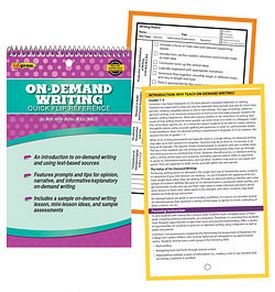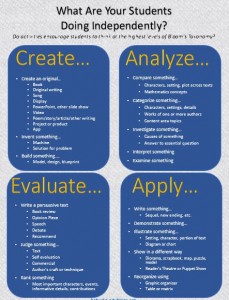 I was so excited to get my newest Quick Flip in the mail today! On Demand Writing is now in a Quick Flip book! Check it out. It has a description of each of the three text types, hints for teaching students how to produce writing on demand, and some assessment ideas as well. Visit Edupress for more information!
I was so excited to get my newest Quick Flip in the mail today! On Demand Writing is now in a Quick Flip book! Check it out. It has a description of each of the three text types, hints for teaching students how to produce writing on demand, and some assessment ideas as well. Visit Edupress for more information!
Author Archives: Beth Anne Burke
Independent Work That Makes You think
 You are convinced to stop using worksheets, but that begs the question: What do I do instead? What kinds of activities can I assign that will keep students on task so I can work with groups and yet require them to think deeply?
You are convinced to stop using worksheets, but that begs the question: What do I do instead? What kinds of activities can I assign that will keep students on task so I can work with groups and yet require them to think deeply?
Using Bloom’s Updated Taxonomy to guide your planning will help to stimulate higher level thinking in your students. Think about it: actually CREATING something–their own version of a book, a machine, an essay or written response–requires a lot more time and effort than simply asking them to remember some information and jot it down on a worksheet.
Requiring students to do activities that are at higher levels has an added benefit: it usually meets a larger number of standards than lower level tasks.
What are some things students can do to show their learning and thinking?
Apply what you read by:
- writing a sequel or new ending.
- illustrating or diagramming
- reorganizing into a chart or table
Analyze what you read by:
- comparing two texts or elements of a text
- categorize something
Evaluate what you read by:
- writing an opinion or persuasive text
- judging something
- ranking something (characters, texts, authors, etc)
Create something based on what you read by:
- writing an original text
- making something related to what you read
- inventing something based on what you read
You can lead a student to a worksheet…
But does it make him think?
I thought that worksheets were extinct, or at least on the endangered list. I imagined reading the obituary in the paper: Frank Shaffer (and his cronies) is dead!. But alas, I still seem worksheets appearing in the habitats of our classrooms. Sometimes there are herds of them, stapled together in packets. [Did you feel my shudder?]
Worksheets are good for one thing: making students work–keeping them occupied for a period of time so that the teacher can meet with groups or tend to other things. The problem that work is not synonymous with think. One common thread with recent innovations in education, especially the Common Core State Standards, is that students need to develop the ability to think. They need to think about texts and about problems, and be able to apply, synthesize, evaluate, and create. (Sound familiar? These verbs are common to many CC Standards and Bloom’s Taxonomy. So, how do you decide whether to use a worksheet?
Here are some guiding questions.
- Is the worksheet busy work? Are you just assigning it so students have something to do while you work with groups, administer running records, or do something else? If the answer is yes, say no to the sheet.
- Do the students clearly understand what to do? I have been in lots of classrooms in which students are going through the motions of completing an activity without knowing why they are doing it or what it is supposed to do. Or, even worse, students don’t know what to do so they find other, less productive activities, such as disrupting class.
- Does it allow students to demonstrate learning in specific standards (CCSS)? The goal of any student activity should be to enhance learning and growth in the Standards.
- Can the objective be accomplished with another, more hands-on activity? Student learning is increased through collaborative and cooperative activities.
- Does this activity require higher level thinking? This is the million dollar question. Here is the bonus: activities that require higher level thinking often increase motivation and keep students engaged longer.
This Infographic encourages you to put down that worksheet!
What do you do instead of worksheets? My next blog post will offer some suggestions.